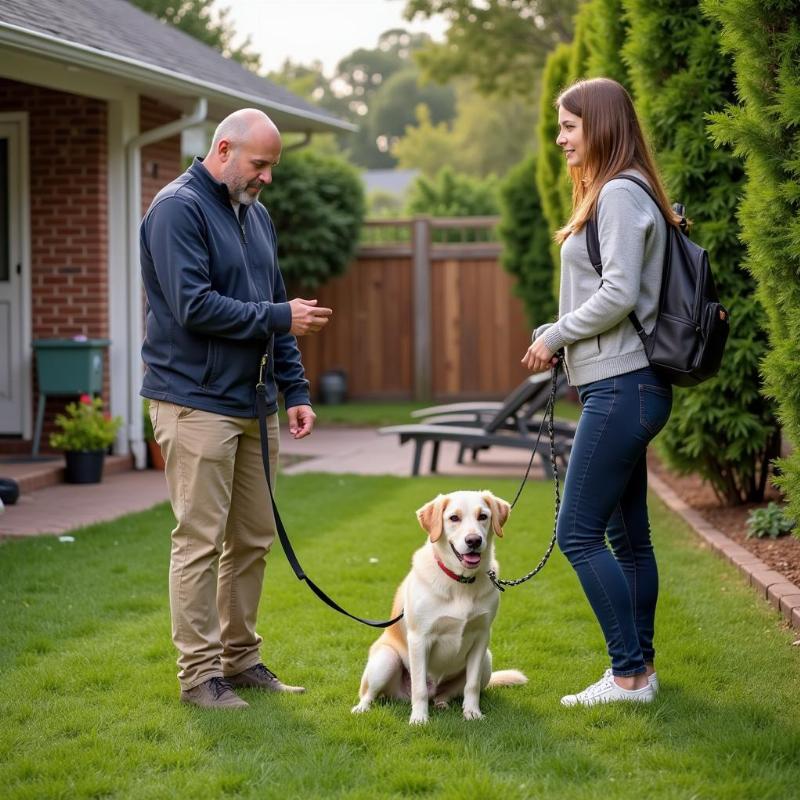Housebreaking a dog can be challenging, and many owners find themselves struggling with a dog that refuses to go potty outside. This can be frustrating, but understanding the reasons behind this behavior is the key to solving the problem. This article will explore the common causes of this issue and provide effective solutions to help your furry friend feel comfortable eliminating outdoors.
Why Your Dog Refuses to Go Potty Outside
Several factors can contribute to a dog’s reluctance to relieve themselves outside. Fear, anxiety, and negative associations with the outdoors are often at the root of the issue. Puppies, especially, can be easily overwhelmed by new sights, sounds, and smells, making the outdoor experience intimidating. A past traumatic event, such as a loud noise or an encounter with another animal, can also create a negative association with going outside. Medical conditions, such as urinary tract infections, can also make it painful for your dog to urinate and may lead to accidents indoors. Changes in routine, a new home, or even a different type of grass can also disrupt a dog’s potty habits. Lastly, improper or incomplete house-training methods can confuse your dog and hinder their progress.
Addressing Fear and Anxiety
If fear or anxiety is the culprit, create a positive association with the outdoors. Start by taking your dog outside on a leash to a designated potty area in your yard. Keep the initial outings short and positive, rewarding your dog with praise and treats when they eliminate. Speak in a calm, reassuring voice and avoid making sudden movements. Gradually increase the time spent outside as your dog becomes more comfortable.
Retraining Your Dog to Go Potty Outside
Sometimes, a refresher course in potty training is necessary. Establish a consistent routine for taking your dog outside, such as first thing in the morning, after meals, and before bedtime. Choose a specific spot in your yard and take your dog there every time. Use a verbal cue, such as “go potty,” to signal the desired behavior. Reward your dog immediately after they eliminate. Clean up any accidents indoors thoroughly with an enzymatic cleaner to eliminate odors that may attract your dog back to the same spot.
 Retraining a Dog to Go Potty in the Right Spot
Retraining a Dog to Go Potty in the Right Spot
Medical Considerations
If your dog suddenly stops going to the bathroom outside, consult your veterinarian to rule out any underlying medical conditions. A urinary tract infection or other health issues can cause discomfort and changes in urination habits. Your veterinarian can diagnose and treat these conditions, making it easier for your dog to eliminate comfortably outdoors.
Creating a Dog-Friendly Potty Area
Making your dog’s outdoor potty area more inviting can encourage them to use it. Choose a spot that is easily accessible and relatively private. Consider using a specific type of surface, such as grass, gravel, or mulch, that your dog prefers. Keep the area clean and free of debris. You can even add a potty training attractant spray to encourage your dog to eliminate in the designated area.
Conclusion
Addressing a dog’s reluctance to go potty outside requires patience, understanding, and consistent effort. By identifying the underlying cause, whether it’s fear, anxiety, a medical condition, or simply a need for retraining, you can effectively help your furry friend overcome this challenge. Remember to create a positive and encouraging environment, and celebrate each success along the way. With time and dedication, you can achieve a harmonious and accident-free home.
FAQ
- How long does it take to retrain a dog to go potty outside? It varies depending on the dog’s age, history, and the consistency of the training. It can take anywhere from a few days to several weeks.
- What should I do if my dog has an accident inside? Clean it up thoroughly with an enzymatic cleaner to remove the odor and discourage repeat offenses. Avoid scolding your dog, as this can make them more anxious.
- Can I use puppy pads indoors while training my dog to go potty outside? While puppy pads can be a temporary solution, they can sometimes confuse a dog. It’s best to focus on outdoor potty training from the start.
- Should I take my dog to the same spot every time? Yes, consistency is key. Taking your dog to the same spot helps them associate that area with eliminating.
- What if my dog is afraid of going outside at night? Try using a flashlight or headlamp to make them feel more secure. Accompany them outside and offer reassurance.
- Is it okay to leave my dog outside for extended periods to encourage them to go potty? No, leaving your dog outside unattended for long periods can be detrimental to their well-being. Short, supervised potty breaks are more effective.
- When should I consult a veterinarian? If your dog’s potty habits change suddenly or if they exhibit signs of discomfort, consult a veterinarian to rule out medical issues.
Related Articles
- my dog won’t go to the bathroom outside anymore
- dog won’t go to the bathroom outside
- backyard potty area for dogs
About Beautdogs.us
Beautdogs.us is your premier online destination for all things dog-related in the US. We offer expert advice on dog breeds, care, and products, catering to both new and experienced dog owners. Our mission is to provide you with reliable and engaging content to ensure a happy and healthy life for your canine companion. Explore our extensive resources, discover the perfect products for your furry friend, and become part of the Beautdogs.us community. Contact us at [email protected] or +1 501-555-7529 for any inquiries.